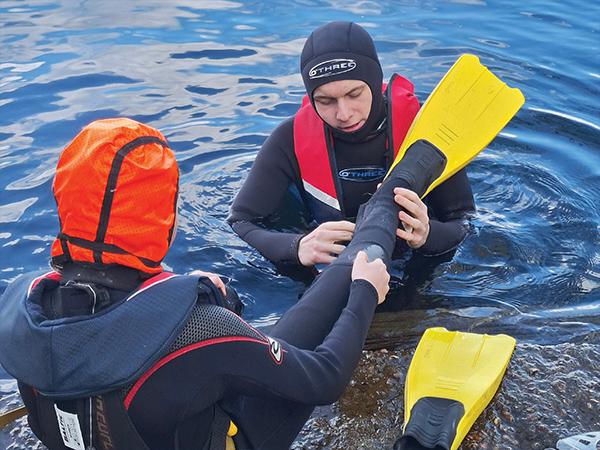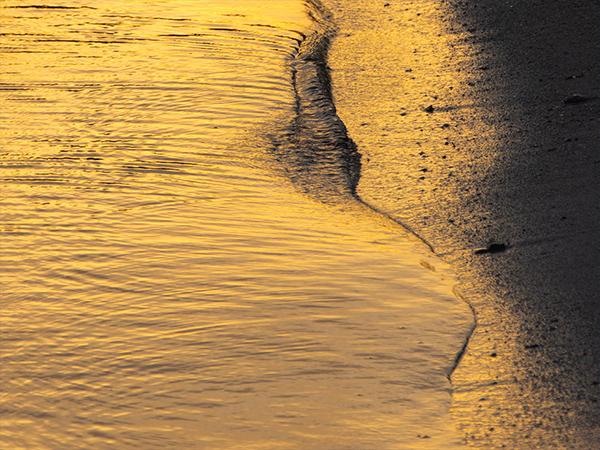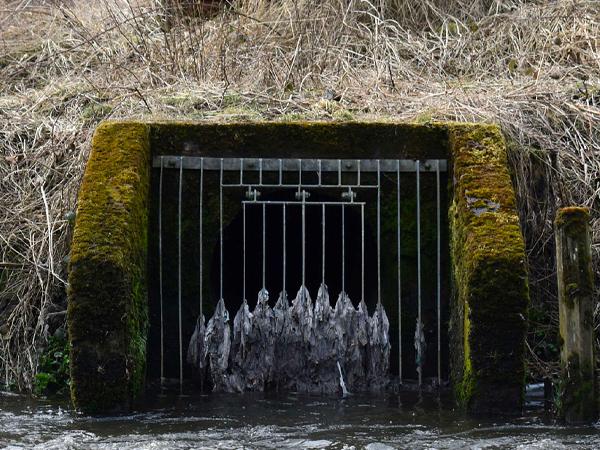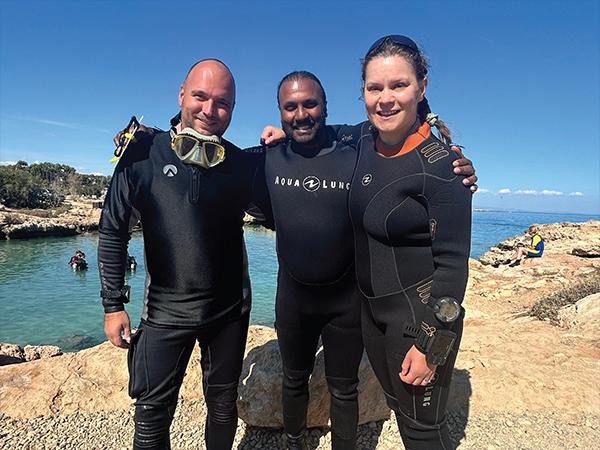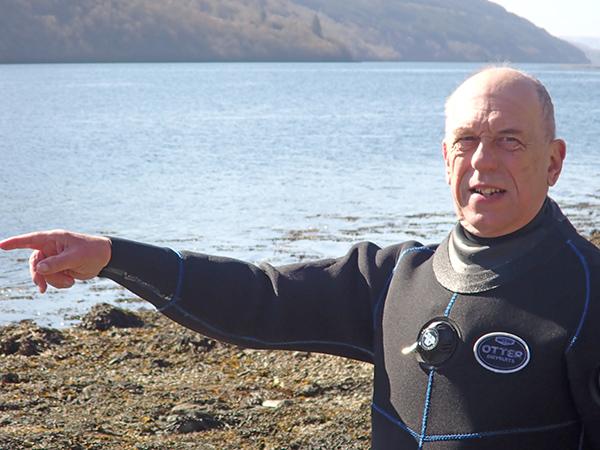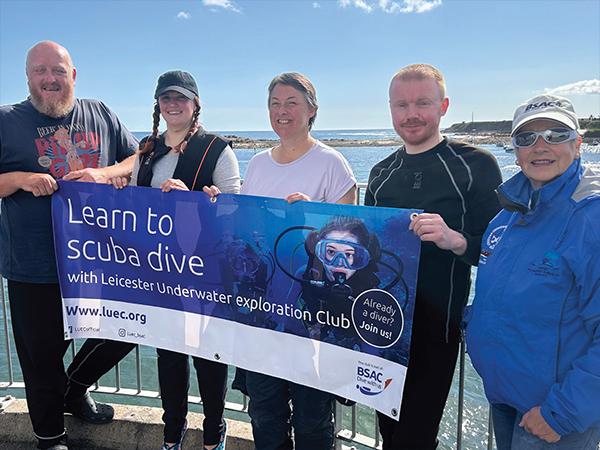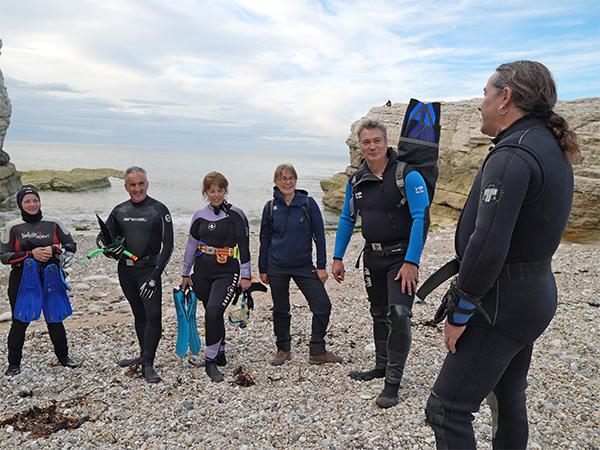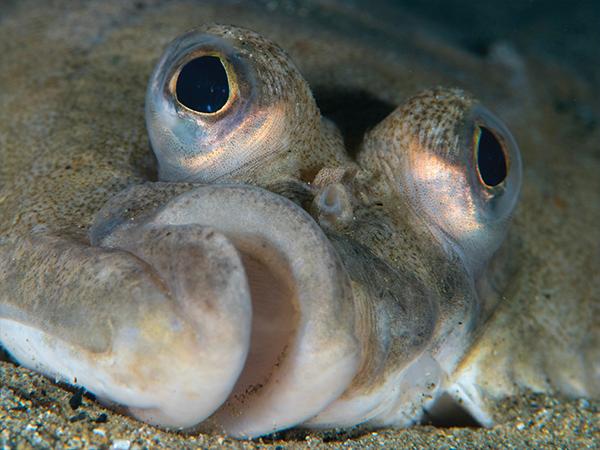As divers and snorkellers, we naturally want to safeguard the precious waters and marine life we have.
We are the people who see what is happening underwater, and we have contributed our knowledge to the understanding of this underwater world in so many ways over the decades. Now our contribution is more important than ever.
The guidelines are for our community to think about, and perhaps incorporate into their diving and snorkelling practices to help protect and preserve our diverse marine environment.
We recognise that we are in a climate emergency and that we should act now to make sure we dive thoughtfully and in ways sensitive to the needs of the environment.
Download diver and snorkeller guidelines to protect our seas
Diving and snorkelling activity
Reduce carbon emissions
We should endeavour to reduce our carbon emissions. While some emissions are inevitable through daily activity, there are some steps that we can take to control our impact when diving or snorkelling. No matter where you dive or who with (club, training school or simply with a buddy), consider some of the following ideas:
-
Car sharing.
-
Exploring sites closer to you.
-
Flying less.
-
Checking your boat’s fuel efficiency.
-
Where practical, exploring shore diving options.
-
Look after and maintain your kit so it lasts longer.
Prevent pollution
Pollution impacts wildlife, it affects the quality of water we use, the air that we breathe and the food we eat. As divers and snorkellers, we can help to improve the situation by:
-
Doing underwater litter picks.
-
Reporting ghost fishing and abandoned gear on wrecks and reefs at ghostfishing.co.uk/report.
-
If RIB diving, using the surface interval for a shore-based litter pick.
-
Avoiding single-use plastics, so bringing refillable water bottles and sandwich boxes.
-
Leaving nothing but bubbles.
-
Making sure all equipment is well maintained and working at its most efficient.
-
For sun protection, using rash vests and/or reef-safe sunscreen.
Boat activities
Underwater noise — This can have a significant impact on marine life, especially whales and dolphins. Some divers / coxswains prefer to turn off the boat’s echo sounder in transit, but only when safe to do so.
Emissions — A well-maintained engine is important in reducing noise pollution.
Take all litter home, throw nothing into the sea.
If RIB diving:
- A well-serviced engine is quieter and more efficient.
- The right propeller for the engine makes a significant fuel economy — check the diameter and pitch.
- Take only what you need — more weight = more fuel.
- Get the divers and kit loaded for optimum performance.
- Adjust trim and throttle to sea conditions.
- Minimise changing throttle to keep revs in the most efficient range — usually between 3,000 – 4,000 rpm.
If hardboat diving:
- Take only what you need — more weight = more fuel.
- A charter boat skipper will usually drive at the most economical speed for the conditions and their boat.
Oil spills — Keep an eye out for oils spills from your boat. It usually means that urgent maintenance is needed, and can affect your safety, as well as the health of the marine environment.
Invasive non-native species (INNS) — INNS can have devastating environmental impacts, spread disease, restrict navigation, block waterways, clog up propellers and cost billions to manage. Here are the key steps we should all do to stop the spread:
- Check – Inspect your equipment, boat and trailer for any bits that may be clinging on. Remove anything you find and bin it. Don’t throw it back in the water or leave it on land thinking it’ll die. Many can grow back from just a tiny fragment.
- Clean - Remember that some invasive species can be/have microscopic life stages and are invisible to the naked eye. Give everything a good rinse with fresh water, as you should anyway. Don’t forget to flush out the engine, rinse ropes, and anchor chains, and get those hard-to-reach places on your trailer.
- Dry – Ensuring surfaces have time to dry out properly is a vital part of the process. Often it is the drying that does the killing. There may still be microscopic bits in places that you’ve not quite managed to flush or scrub, but drying them to a crisp will finish the job.
- Report sightings – Ideally, take a photo of it in situ. You will also need to record, the date, what species you think it is, and the location. The easiest way to submit your record is through the iRecord app or website. If you’re not confident about species ID, speak to your local Seasearch group.
The GB Non-Native Species Secretariat Information Portal (www.nonnativespecies.org) has lots of useful information including species ID sheets. It is also worth checking out The Green Blue (www.thegreenblue.org.uk), they offer free resources including a “Coastal Biosecurity Signage Kit” that you can display in club facilities to encourage everyone to do their part to stop the spread.
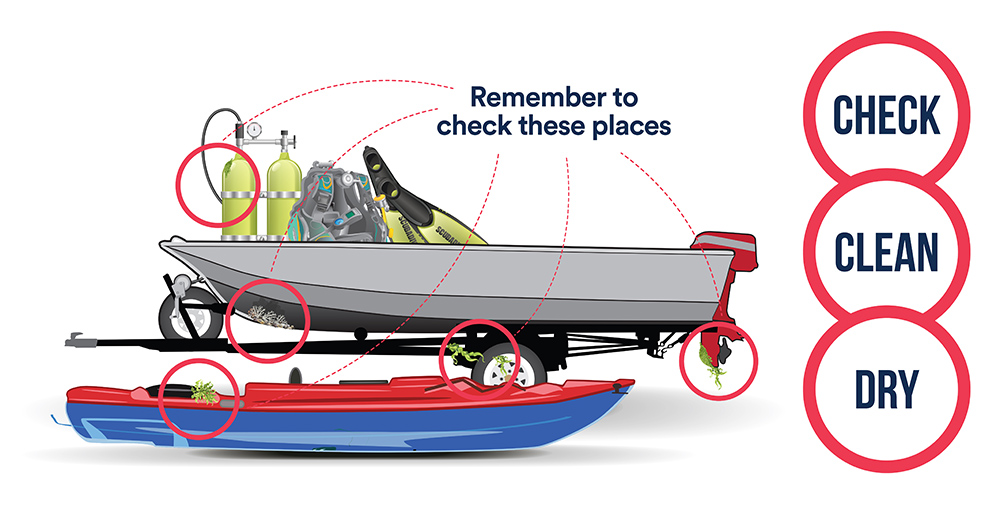
Diving and snorkelling generally
-
When diving, good buoyancy and making sure your kit is streamlined really helps protect the seabed, reef, or wreck from accidental damage.
-
Good finning skills that don’t kick up the silt, such as frog kicks, can make a real difference.
-
If taking images, observe the British Society of Underwater Photographer’s Code of Conduct.
-
When setting up a camera shot, be careful not to kneel on fragile wreck or marine life.
-
Leave the site as you would wish to find it and if removing litter, dispose of it properly once out of the water.
Interacting with wildlife
-
Follow any relevant local codes of conduct when interacting with wildlife.
-
If wildlife interacts with you, enjoy watching. However, be aware that getting too close or touching can severely stress the animal.
-
Try not to drive boats close to seal haulouts or through rafting seabirds.
-
Avoid hand-feeding marine life. It can make fish and mammals aggressive, which can cause harm to the animal.
-
Be aware that it is illegal to intentionally disturb some species or seabed habitats. Check your national government website for more information.
-
Check out the WiSe scheme if you want to know more about minimising disturbance.
-
Lots of us dive to see wildlife. We should be careful not to interrupt natural behaviours, like feeding, mating and egg-laying. After all, they are what we are diving to observe.
-
In some areas diving in the shallows can result in seals or dolphins coming to check you out, and maybe interacting with you. They will initiate, and when they have had enough they will leave. If they don’t want to interact with you, they won’t, but be sensitive, avoid petting them.
-
One great thrill is to see dolphins or whales when we are transiting to and from our dive sites. Never chase, but if they choose to ride your bow wave then maintain a steady course and speed and enjoy the experience. When they have had enough, they will leave.
- Check out the Defra (Department for Environment, Food and Rural Affairs) Marine and Wildlife code which provides guidance on how act responsibly around marine life when you visit the coast.
Wreck diving
-
On wrecks, disturb as little as possible. Moving material around can destabilise the surface, which can then lead to the wreck breaking down more quickly.
-
Shipwrecks are a major part of the underwater environment, so remember to keep neutral buoyancy, fin without kicking up the wreck, tuck in the dangly gauges, and dive with care.
-
Preserve the structure by careful swimming and watching out for loose or fragile pieces.
-
Make images your souvenirs. Leave the wreck for others to enjoy.
-
Each country has different laws around wreck diving. Make sure you know what is allowable on the wrecks you dive in the country you are divining in.
-
Wrecks can harbour a huge diversity of marine life. Spending time looking is a good way to enjoy the dive.
Food and travel
Responsible tourism
Tourism supports livelihoods and allows us to experience a huge variety of nature. We support those who engage in responsible tourism. To do that:
- Look for good environmental credentials, e.g. UK’s Green Tourism Award.
- Take fewer trips and stay longer. Air travel is one of the most carbon-intensive activities an individual can make. If your commitments allow, consider fewer flights and longer stays.
- Choose local. Support the local community you are visiting by choosing to eat, buy and stay locally. This is not only likely to reduce your environmental impact but support the local economy and livelihoods.
- Consider a staycation. Your travel doesn’t need to take you to a far-flung overseas destination. Consider taking time to explore your home shores.
- Don’t support or encourage activities that encourages damage to the environment, such as anchoring on reefs or in wrecks.
- Avoid visiting marine parks that keep captive whales and dolphins.
Sustainable seafood
If we choose to eat seafood it is important that we understand where it comes from, and how it was harvested. Sustainability should be the watchword.
- Use the Marine Conservation Society’s Good Fish Guide to make sure you eat fish that have sustainable stocks.
- Eat seasonally available and locally sourced fish where possible.
- In many places, divers are limited to the amount of seafood one person can take from the bottom.
- Make sure you know the local regulations.
- Make sure it meets the size regulations.
- Take only what you are going to consume. - Support fisheries and methods that use low impact and sustainable practices.
Get more actively involved
Contribute to marine research
Citizen science allows us to collect data in an organised way that can then be used by scientists to expand our understanding of what is happening underwater and advise policy makers on a range of issues.
Divers and snorkellers are in a great position to contribute to long-standing citizen research science projects such as Seasearch, the data of which is used to inform policies on marine conservation. The following projects and organisations are all good to be involved with:
- BSAC Operation Oyster
- Seasearch
- Project Seagrass
- The Seahorse Trust
- NAS Adopt a Wreck
- Maritime Archaeology Trust volunteer section
- Branch or regional wreck recording projects
Going the extra mile with your diving and snorkelling
Are you still wanting to do more to protect our seas?
-
Do BSAC courses, such as the Marine Life Appreciation course and the Wreck Diving course to get even more enjoyment out of what you see.
-
BSAC webinars also cover a range of topics that might encourage you to go the extra mile.
-
Train with the British Divers Marine Life Rescue.
-
Do the online seahorse ecology course with the Seahorse Trust.
-
Contribute to UK cephalopod records.
-
Learn more about abandoned fishing gear that is still catching and killing marine life long after it has been abandoned. For example, report abandoned gear to Ghost Fishing UK using their report form. Removing ghost gear can be dangerous. Leave it to the specialists, but learn what to look for so that your report is accurate and helpful.
-
Get involved in projects that bring the underwater world to the public’s attention.
Getting involved in and supporting campaigning
If you feel that you want to be really active about the state of the environment, then there are lots of opportunities to get more involved.
- If you have any suggestions or feedback for the BSAC Environment Team, please email environment@bsac.com.
- Marine Conservation Society is a campaigning organisation you may wish to join.
- Keep your eyes open for government consultations that you could respond to as a private individual.
- Look at other campaigning organisations, such as Surfers Against Sewage or Sea Shepherd, and find out what they do. If it looks right for you, add your voice because you really can make a difference.
Download diver and snorkeller guidelines to protect our seas

